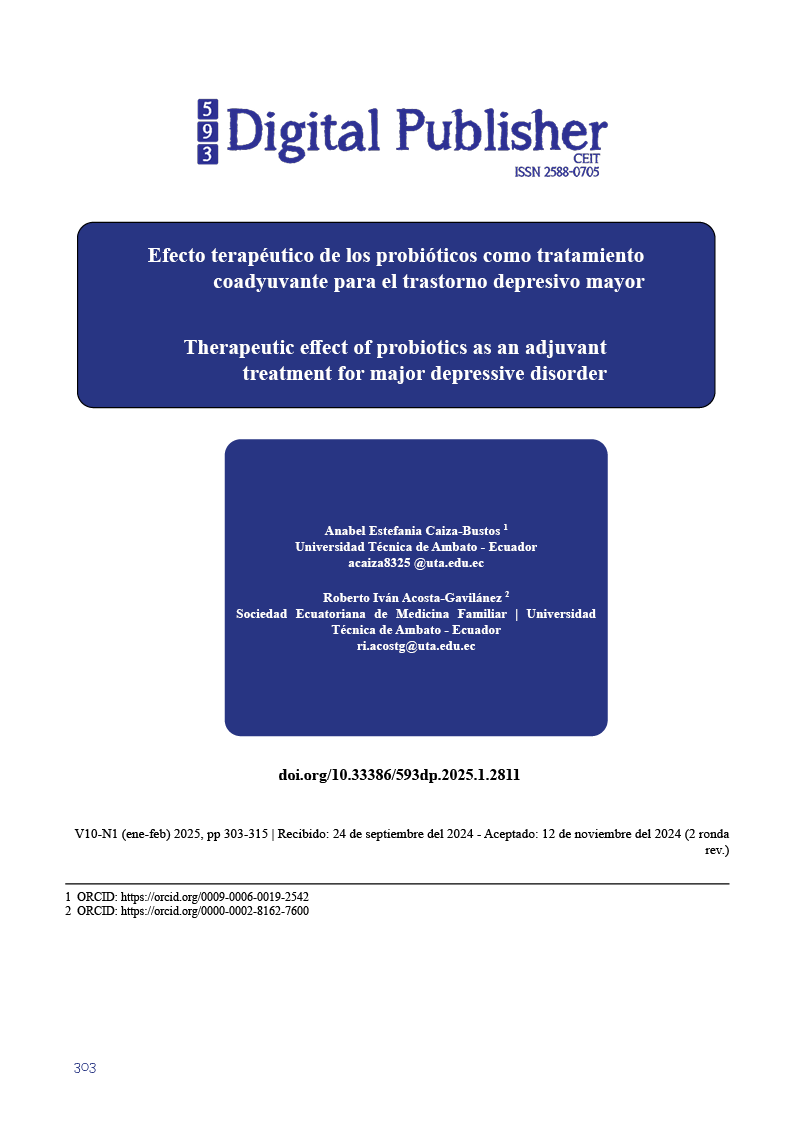Therapeutic effect of probiotics as an adjuvant treatment for major depressive disorder
Main Article Content
Abstract
Introduction: In the field of mental health, factors such as unbalanced diet, infections, and sustained stress lead to alterations in the functions of the intestinal microbiota, including the synthesis of neuroactive compounds. Probiotics are attributed a potential therapeutic effect in pathologies such as major depressive disorder (MDD) by modulating the gut-brain microbiota axis. Objective: To identify probiotic strains that have potential effects on the symptoms of major depressive disorder.. Materials and methods: A descriptive bibliographic review was carried out with information collected from meta-analyses, systematic reviews, randomized controlled studies, bibliographic reviews, intervention studies, pilot studies obtained from specialized databases such as PubMed, ScienceDirect and Cochrane Library published between 2020 and 2024.Conclusions: The effects are specific to each strain. The capacity of Lactobacillus helveticus and Bifidobacterium longum to boost tryptophan along the serotonin pathway, improving mood, anhedonia and sleep quality, is highlighted. Bifidobacterium breve CCFM1025 regulates the serotonergic system and the metabolism of tryptophan, a precursor of serotonin, capable of alleviating the symptoms of MDD. Despite the positive findings around the strains studied, research in larger populations is required to determine the efficacy and safety of probiotic supplementation to the classic treatment of MDD.
Downloads
Article Details

This work is licensed under a Creative Commons Attribution-NonCommercial-ShareAlike 4.0 International License.
1. Derechos de autor
Las obras que se publican en 593 Digital Publisher CEIT están sujetas a los siguientes términos:
1.1. 593 Digital Publisher CEIT, conserva los derechos patrimoniales (copyright) de las obras publicadas, favorece y permite la reutilización de las mismas bajo la licencia Licencia Creative Commons 4.0 de Reconocimiento-NoComercial-CompartirIgual 4.0, por lo cual se pueden copiar, usar, difundir, transmitir y exponer públicamente, siempre que:
1.1.a. Se cite la autoría y fuente original de su publicación (revista, editorial, URL).
1.1.b. No se usen para fines comerciales u onerosos.
1.1.c. Se mencione la existencia y especificaciones de esta licencia de uso.
References
Chakrabarti A, Geurts L, Hoyles L, Iozzo P, Kraneveld AD, La Fata G. The microbiota–gut–brain axis: pathways to better brain health. Perspectives on what we know, what we need to investigate and how to put knowledge into practice. Cellular and Molecular Life Sciences. Springer Science and Business Media Deutschland GmbH. 2022; Vol. 79(2): 80. doi:10.1007/s00018-021-04060-w
Álvarez J, Fernández Real JM, Guarner F, Gueimonde M, Rodríguez JM, Saenz de Pipaon M. Gut microbes and health. Gastroenterologia y Hepatologia. Ediciones Doyma; 2021; Vol. 44(7): 519–35. doi:10.1016/j.gastrohep.2021.01.009.
Guillot CC, Profesor CE. Intestinal microbiota and its new challenges. Revista AVFT [Internet]. 2022; 41(8): 568–73. doi:10.5281/zenodo.7443084
Gao J, Zhao L, Cheng Y, Lei W, Wang Y, Liu X. Probiotics for the treatment of depression and its comorbidities: A systemic review. Frontiers in Cellular and Infection Microbiology. Frontiers Media S.A. 2023; Vol. 13. 10.3389/fcimb.2023.1167116
Jach ME, Serefko A, Szopa A, Sajnaga E, Golczyk H, Santos LS. The Role of Probiotics and Their Metabolites in the Treatment of Depression. Molecules. MDPI; 2023; Vol. 28. doi:10.3390/molecules28073213
Johnson D, Thurairajasingam S, Letchumanan V, Chan KG, Lee LH. Exploring the role and potential of probiotics in the field of mental health: Major depressive disorder. Nutrients. MDPI AG. 2021; Vol. 13. 8. doi:10.3390/nu13051728
Alli SR, Gorbovskaya I, Liu JCW, Kolla NJ, Brown L, Müller DJ. The Gut Microbiome in Depression and Potential Benefit of Prebiotics, Probiotics and Synbiotics: A Systematic Review of Clinical Trials and Observational Studies. International Journal of Molecular Sciences. MDPI. 2022; Vol. 23: 4494. doi:10.3390/ijms23094494
Corea Del Cid MT. La depresión y su impacto en la salud pública. Rev Med Hondur. 2021; Vol. 89(Supl.1): 46–52. doi:10.5377/rmh.v89iSupl.1.12047
Cui L, Li S, Wang S, Wu X, Liu Y, Yu W. Major depressive disorder: hypothesis, mechanism, prevention and treatment. Signal transduction and targeted therapy. 2024; Vol. 9: 30. doi:10.1038/s41392-024-01738-y https://www.nature.com/articles/s41392-024-01738-y.pdf
Tasé Martínez MJ, Cajilema Ávila AP, Garzón Zabala AE. Prevalencia y factores asociados a la depresión en jóvenes universitarios en Macas, Ecuador. Revista Ecuatoriana de Psicología. 2023; Vol. 6(16): 256 - 263. doi:10.33996/repsi.v6i16.103
Picó-Monllor JA, Sala-Segura E, Tobares RA, Moreno-Ochando A, Hernández-Teruel A, Navarro-Lopez V. Influence and Selection of Probiotics on Depressive Disorders in Occupational Health: Scoping Review. Nutrients. Multidisciplinary Digital Publishing Institute (MDPI); 2023; Vol. 15. doi:10.3390/nu15163551
Kazemi A, Noorbala AA, Azam K, Eskandari MH, Djafarian K. Effect of probiotic and prebiotic vs placebo on psychological outcomes in patients with major depressive disorder: A randomized clinical trial. Clinical Nutrition. 2019; 38(2):522–8. doi:10.1016/j.clnu.2018.04.010
Tian P.Chen Y. Zhu H.Wang L. Qian X.Zou R. Zhao J.Zhang H.Qian L. Wang Q. Wang G.Chen W. Bifidobacterium breve CCFM1025 atenúa el trastorno de depresión mayor mediante la regulación del microbioma intestinal y el metabolismo del triptófano: un ensayo clínico aleatorizado. Cerebro, comportamiento e inmunidad. 2022; 100: 243-241. doi: 10.1016/j.bbi.2021.11.023
Nikolova VL, Cleare AJ, Young AH, Stone JM. Updated review and meta-analysis of probiotics for the treatment of clinical depression: Adjunctive vs. stand-alone treatment. Journal of Clinical Medicine. MDPI. 2021; Vol. 10: 1–14. 7. doi:10.3390/jcm1004067
Schaub AC, Schneider E, Vazquez-Castellanos JF, Schweinfurth N, Kettelhack C, Doll JPK, et al. Clinical, gut microbial and neural effects of a probiotic add-on therapy in depressed patients: a randomized controlled trial. Transl Psychiatry. 2022;12(1). doi:10.1038/s41398-022-01977-z
Yong SJ, Tong T, Chew J, Lim WL. Antidepressive Mechanisms of Probiotics and Their Therapeutic Potential. Vol. 13, Frontiers in Neuroscience. Frontiers Media S.A.; 2020; Vol. 13: 1361. doi:10.3389/fnins.2019.01361
Otaka M, Kikuchi-Hayakawa H, Ogura J, Ishikawa H, Yomogida Y, Ota M, et al. microorganisms Effect of Lacticaseibacillus paracasei Strain Shirota on Improvement in Depressive Symptoms, and Its Association with Abundance of Actinobacteria in Gut Microbiota. 2021; 9(5): 1026. doi:10.3390/microorganisms9051026
Wallace CJK, Milev R V. The Efficacy, Safety, and Tolerability of Probiotics on Depression: Clinical Results From an Open-Label Pilot Study. Front Psychiatry. 2021; 15: 12. doi:10.3389/fpsyt.2021.618279
Rudzki L, Ostrowska L, Pawlak D, Małus A, Pawlak K, Waszkiewicz N, et al. Probiotic Lactobacillus Plantarum 299v decreases kynurenine concentration and improves cognitive functions in patients with major depression: A double-blind, randomized, placebo controlled study. Psychoneuroendocrinology. 2019; 100: 213–22. doi:10.1016/j.psyneuen.2018.10.010
Shi S, Zhang S, Kong L. Effects of Treatment with Probiotics on Cognitive Function and Regulatory Role of Cortisol and IL-1β in Adolescent Patients with Major Depressive Disorder. Life. 2023; 13(9). doi:10.3390/life13091829
Kazemi A, Noorbala AA, Djafarian K. Effect of probiotic and prebiotic versus placebo on appetite in patients with major depressive disorder: post hoc analysis of a randomised clinical trial. Journal of Human Nutrition and Dietetics. 2020 Feb 1;33(1):56–65.DOI: https://doi.org/10.1111/jhn.12675
Li J, Wang J, Wang M, Zheng L, Cen Q, Wang F, et al. Bifidobacterium: a probiotic for the prevention and treatment of depression. Frontiers in Microbiology. Frontiers Media S.A. 2023; Vol. 14. doi: 10.3389/fmicb.2023.1174800
Marotta A, Sarno E, Casale A Del, Pane M, Mogna L, Amoruso A, et al. Effects of probiotics on cognitive reactivity, mood, and sleep quality. Front Psychiatry. 2019; 10(MAR). doi: 10.3389/fpsyt.2019.00164
Kouba BR, de Araujo Borba L, Borges de Souza P, Gil-Mohapel J, Rodrigues ALS. Role of Inflammatory Mechanisms in Major Depressive Disorder: From Etiology to Potential Pharmacological Targets. Cells. Multidisciplinary Digital Publishing Institute (MDPI); 2024; Vol. 13. doi:10.3390/células13050423



